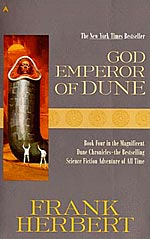
![]() verkisto
verkisto
7/26/2016
![]()
With this book, Herbert continues to talk about power, and this time he takes a look at what happens when someone has an infinite amount of it. Leto II, the son of Paul Muad'Dib, has become mostly sandworm, thanks to his beginning transformation that took place at the end of Children of Dune. His prescience is such that he can see almost everything in the entire universe, and predict how things will go. He has unlimited power, he is nearly immortal (3,500 years have passed since the ending of Children of Dune), and he is so feared that everyone lets him get away with whatever he wants.
Herbert doesn't hold back from portraying Leto as a tyrant. Aside from his issuing commands based on his own whims, he's portrayed as having Duncan Idaho resurrected as a ghola over and over again, such that Duncan has been a part of Leto's household since he took control of Arrakis (note again that this happened 3,500 years ago). What's even more interesting is that Duncan's reincarnations apparently have a history of rebelling against Leto for one reason or another, to the point where Duncan rarely lives out to the end of his normal life; he's usually killed by Leto as Duncan tries to kill Leto once he realizes how much of a tyrant he's become. It's telling, because it suggests that Duncan has been resurrected many thousands of times, especially when Leto and his other advisers refer to him as "The Duncan."
The story follows the end of one Duncan's life, and the start of another cycle with the next. It's a good storytelling technique, since each reincarnation of Duncan requires explaining what's happened in the intervening 3,500 years. Duncan serves as the device to explain to the reader those events, and it also allows us to see the entire transition that takes place that enables Duncan to turn on his loyalty to the Atreides and try to kill Leto. Given that the story jumps so far ahead in time, it's a useful way to convey a lot of that information.
God Emperor of Dune is a logical step in the story that Herbert tells with the Dune Chronicles, but that's not to say that it's an easy read, nor one that makes a whole lot of sense. Thematically, it's like it's telling the story of a twisted, power-hungry tyrant, but it also drops hints that Leto is doing all this with a clear goal in mind. His prescience gives him the ability to see where the future leads, and unless I'm misinterpreting part of the story, his tyranny is used to protect the greater population of the entire universe. He (and, I'm guessing, Herbert himself) speaks to male vs. female armies, and the consequences of having one over another. There was the potential of the argument behind it as being controversial due to it being sexist, but Herbert married the argument with Leto's ability to see the entirety of human history, which enabled him to compare them directly. In the end, it felt like it was a progressive step.
Overall, the book doesn't quite compare to the events that took place in the first three books, but if one looks at the book in the context of what Herbert has to say about power, then it fits in well with the whole series. It's even easy to justify the weirdness that Herbert incorporates into the story, since it was relevant to what he had to say about power. If the series keeps progressing in this direction, then I doubt I'll be disappointed. Story issues aside, the theme has been enough to carry me through the entire series.